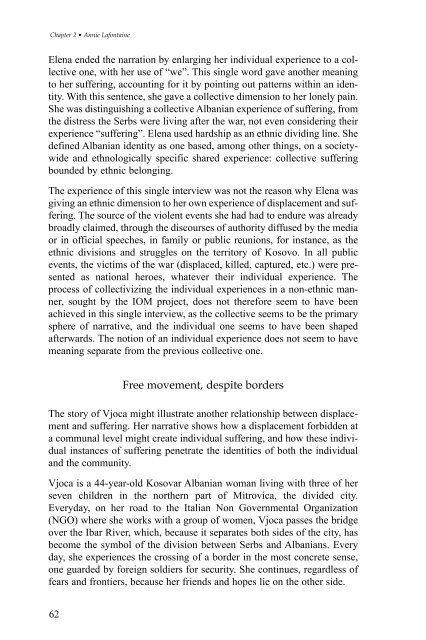Psychosocial Notebook - IOM Publications - International ...
Psychosocial Notebook - IOM Publications - International ...
Psychosocial Notebook - IOM Publications - International ...
Create successful ePaper yourself
Turn your PDF publications into a flip-book with our unique Google optimized e-Paper software.
Chapter 2 • Annie Lafontaine<br />
Elena ended the narration by enlarging her individual experience to a collective<br />
one, with her use of “we”. This single word gave another meaning<br />
to her suffering, accounting for it by pointing out patterns within an identity.<br />
With this sentence, she gave a collective dimension to her lonely pain.<br />
She was distinguishing a collective Albanian experience of suffering, from<br />
the distress the Serbs were living after the war, not even considering their<br />
experience “suffering”. Elena used hardship as an ethnic dividing line. She<br />
defined Albanian identity as one based, among other things, on a societywide<br />
and ethnologically specific shared experience: collective suffering<br />
bounded by ethnic belonging.<br />
The experience of this single interview was not the reason why Elena was<br />
giving an ethnic dimension to her own experience of displacement and suffering.<br />
The source of the violent events she had had to endure was already<br />
broadly claimed, through the discourses of authority diffused by the media<br />
or in official speeches, in family or public reunions, for instance, as the<br />
ethnic divisions and struggles on the territory of Kosovo. In all public<br />
events, the victims of the war (displaced, killed, captured, etc.) were presented<br />
as national heroes, whatever their individual experience. The<br />
process of collectivizing the individual experiences in a non-ethnic manner,<br />
sought by the <strong>IOM</strong> project, does not therefore seem to have been<br />
achieved in this single interview, as the collective seems to be the primary<br />
sphere of narrative, and the individual one seems to have been shaped<br />
afterwards. The notion of an individual experience does not seem to have<br />
meaning separate from the previous collective one.<br />
Free movement, despite borders<br />
The story of Vjoca might illustrate another relationship between displacement<br />
and suffering. Her narrative shows how a displacement forbidden at<br />
a communal level might create individual suffering, and how these individual<br />
instances of suffering penetrate the identities of both the individual<br />
and the community.<br />
Vjoca is a 44-year-old Kosovar Albanian woman living with three of her<br />
seven children in the northern part of Mitrovica, the divided city.<br />
Everyday, on her road to the Italian Non Governmental Organization<br />
(NGO) where she works with a group of women, Vjoca passes the bridge<br />
over the Ibar River, which, because it separates both sides of the city, has<br />
become the symbol of the division between Serbs and Albanians. Every<br />
day, she experiences the crossing of a border in the most concrete sense,<br />
one guarded by foreign soldiers for security. She continues, regardless of<br />
fears and frontiers, because her friends and hopes lie on the other side.<br />
62

















